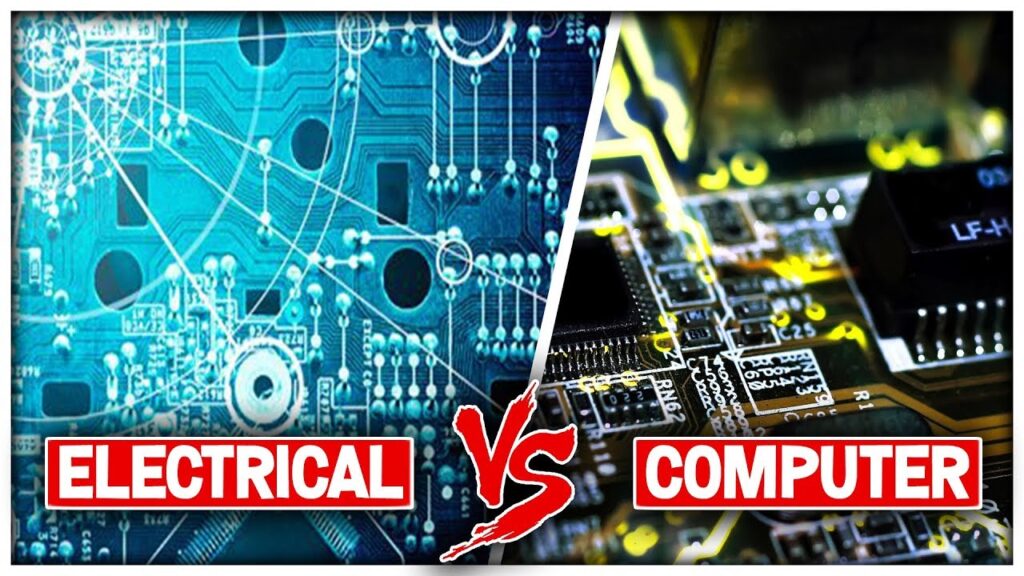Computer science primarily deals with the study of algorithms, data structures, programming languages, software development, and the theoretical foundations of computing. It encompasses a wide range of topics such as artificial intelligence, machine learning, cybersecurity, computer networks, and databases. Computer scientists are concerned with designing and developing efficient algorithms, creating software systems, and solving complex computational problems.
On the other hand, electrical engineering focuses on the study and application of electricity, electromagnetism, and electronics. It covers areas such as circuit design, power systems, control systems, signal processing, telecommunications, and microelectronics. Electrical engineers work on designing, building, and maintaining electrical systems and devices, ranging from power grids and communication networks to consumer electronics and medical devices.
How does Computer Science differ from Electrical Engineering?

Computer Science (CS) and Electrical Engineering (EE) are related fields but have distinct focuses and areas of expertise:
Computer Science
- Focuses on algorithms, data structures, programming languages, software development, artificial intelligence, machine learning, and computer systems.
- CS deals with the theoretical foundations of computation and how to apply these theories to solve practical problems.
- Areas within CS include software engineering, computer graphics, databases, network security, and more.
- CS often emphasizes abstraction, problem-solving, and algorithmic thinking.
Electrical Engineering
- Focuses on the study and application of electricity, electromagnetism, and electronics.
- Deals with the design and analysis of electrical circuits, systems, electronic devices, and power systems.
- Areas within EE include analog and digital electronics, signal processing, communication systems, control systems, power systems, and renewable energy.
- EE often involves understanding physical phenomena and applying principles of physics and mathematics to design and optimize electrical systems.
While there is overlap between the two fields, especially in areas like digital systems and computer hardware, their primary focuses and methodologies are different. Computer Science leans more towards software and algorithm development, while Electrical Engineering is more about hardware design and implementation.
However, with the advancement of technology, interdisciplinary areas like computer engineering have emerged, bridging the gap between CS and EE.
How do Computer Science and Electrical Engineering compare in terms of education?

Computer Science (CS) and Electrical Engineering (EE) have overlapping but distinct educational paths:
Core Curriculum
CS programs typically include courses in programming, algorithms, data structures, computer organization, operating systems, software engineering, databases, and theory of computation.
EE programs cover topics such as circuit analysis, electronics, electromagnetics, digital signal processing, control systems, power systems, and telecommunications.
Mathematics
Both CS and EE require strong mathematical foundations, including calculus, linear algebra, discrete mathematics, probability theory, and statistics.
Focus Areas
CS programs often offer concentrations or elective tracks in areas like artificial intelligence, machine learning, computer graphics, cybersecurity, software engineering, and data science.
EE programs may offer concentrations in fields such as communications, power systems, control systems, embedded systems, microelectronics, and photonics.
Laboratory Work
While CS programs may involve some laboratory work, the emphasis is more on programming assignments, projects, and theoretical problem-solving.
EE programs typically involve extensive laboratory work where students design, build, and test electrical circuits, systems, and devices. This hands-on experience is crucial for understanding hardware design principles.
Senior Projects/Thesis
In both CS and EE, students often complete a senior project or thesis, where they apply their knowledge and skills to solve a real-world problem or conduct research in a specific area of interest.
Career Paths
CS graduates commonly pursue careers as software developers, systems analysts, data scientists, software engineers, cybersecurity specialists, and research scientists.
EE graduates often work in industries such as electronics, telecommunications, power generation and distribution, renewable energy, control systems, semiconductor manufacturing, and aerospace.
Final Words
Computer Science and Electrical Engineering are really important in today’s world of technology. Computer Science is about computers and software, while Electrical Engineering is about electricity and how it’s used in gadgets and machines.
Both fields offer lots of different jobs like making software, working with data, keeping things safe from hackers, and designing electrical stuff.
If you’re thinking about going into one of these fields, think about what you like to do and what you’re good at. And remember, technology is always changing, so you’ll always be learning new things!
